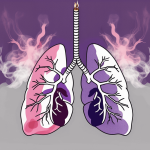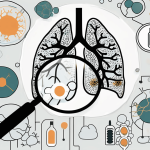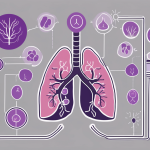Delve into the complexities of lung cancer by exploring the pivotal role of EGFR (Epidermal Growth Factor Receptor). Uncover the science behind EGFR, its connection to lung cancer, and the significance of EGFR mutations in diagnosis and treatment. Discover the innovative targeted therapies revolutionizing lung cancer treatment and the promising future of EGFR research. Stay informed, empowered, and hopeful in the journey towards improved outcomes and a potential cure for EGFR-positive lung cancer.
Lung cancer is a complex disease that affects millions of people worldwide. One of the key factors in the development and progression of lung cancer is EGFR, or the Epidermal Growth Factor Receptor. In this comprehensive guide, we will delve into the role of EGFR in lung cancer, the science behind it, diagnosing EGFR mutations, and the various treatment options available. We will also explore the exciting future of EGFR research and its potential impact on lung cancer prognosis.
The Role of EGFR in Lung Cancer
When it comes to understanding the development and progression of lung cancer, one cannot overlook the crucial role played by EGFR, which stands for Epidermal Growth Factor Receptor. This protein, found on the surface of cells, including those in lung tissue, is responsible for regulating cell growth and division.
What is EGFR?
Epidermal Growth Factor Receptor, or EGFR, is a protein that acts as a signaling molecule on the surface of cells. It is involved in various cellular processes, including cell survival and proliferation. When EGFR is activated by epidermal growth factor (EGF) or other ligands, it sets off a cascade of events within the cell, leading to the promotion of cell growth and division.
EGFR is a transmembrane receptor, meaning it spans the cell membrane and has a portion on the outside of the cell that interacts with ligands, and a portion on the inside that triggers intracellular signaling pathways. This receptor is expressed in many different tissues, including the lungs, where it plays a critical role in maintaining normal lung function.
EGFR and Its Connection to Lung Cancer
Unfortunately, in some cases, the normal functioning of the EGFR gene becomes altered, leading to the abnormal activation of EGFR in lung cells. This can occur through mutations in the EGFR gene or by an excess number of EGFR receptors on the cell surface. These changes result in unchecked cell growth and division, contributing to the development and progression of lung cancer.
EGFR mutations are more commonly found in certain subtypes of lung cancer, such as adenocarcinoma. These mutations can lead to the overactivation of EGFR signaling pathways, driving the uncontrolled growth of cancer cells. It is estimated that around 10-15% of non-small cell lung cancers (NSCLC) harbor EGFR mutations.
Identifying the presence of EGFR mutations in lung cancer patients is crucial for personalized treatment decisions. Patients with EGFR-mutated lung cancer may be eligible for targeted therapies that specifically inhibit the activity of the mutated EGFR. These targeted therapies have shown remarkable efficacy in slowing down the growth of cancer cells and improving patient outcomes.
It is important to note that not all lung cancers involve EGFR mutations. However, for the subset of lung cancers that do have EGFR mutations, targeted therapies can be highly effective in inhibiting the activity of the mutated EGFR and slowing down the growth of cancer cells.
Research continues to shed light on the complex interplay between EGFR and lung cancer. Scientists are exploring new strategies to target EGFR and overcome resistance mechanisms that can develop over time. By understanding the intricate details of EGFR signaling and its role in lung cancer, researchers hope to develop more effective treatments and improve the prognosis for patients.
The Science Behind EGFR and Lung Cancer
The Molecular Biology of EGFR
EGFR, or Epidermal Growth Factor Receptor, belongs to a family of receptors called receptor tyrosine kinases. These receptors play a crucial role in cell signaling, allowing cells to communicate with their environment and respond to various stimuli. When activated, EGFR triggers a cascade of intracellular signaling pathways that regulate cell survival, proliferation, and differentiation.
Within the cell, EGFR interacts with a variety of proteins and molecules, forming a complex network of interactions that ultimately determine the cell’s fate. Mutations in the EGFR gene can disrupt these interactions and lead to the overactivation of the signaling pathways. This overactivation can result in uncontrolled cell growth and the formation of tumors.
Scientists have been studying these molecular mechanisms intensively to gain insights into the development of targeted therapies that can specifically inhibit the abnormal activity of mutant EGFR in lung cancer cells. By understanding the intricate details of EGFR signaling, researchers hope to develop more effective treatments for lung cancer.
How EGFR Mutations Contribute to Lung Cancer
EGFR mutations are found in a subset of non-small cell lung cancers (NSCLC), which is the most common type of lung cancer. These mutations can occur in different regions of the EGFR gene and lead to the production of abnormal EGFR proteins with increased signaling activity.
These abnormal EGFR proteins continuously stimulate cell growth and survival, bypassing the normal regulatory mechanisms that would otherwise suppress their activity. As a result, cancer cells with EGFR mutations can grow and divide rapidly, forming tumors that can spread to other parts of the body.
It is important to note that not all lung cancer patients have EGFR mutations. However, for those who do, targeted therapies have shown promising results. These therapies specifically target the abnormal EGFR proteins, inhibiting their activity and slowing down the growth of cancer cells. By understanding the specific mutations present in a patient’s tumor, doctors can tailor treatment plans to maximize effectiveness and minimize side effects.
Research in this field is ongoing, with scientists continuously exploring new ways to target EGFR mutations and improve treatment outcomes for lung cancer patients. By unraveling the complex molecular biology of EGFR and its role in lung cancer, researchers are paving the way for more personalized and effective therapies.
Diagnosing EGFR Mutations in Lung Cancer
Diagnostic Techniques for Detecting EGFR Mutations
Diagnosing EGFR mutations in lung cancer generally involves molecular tests performed on tumor tissue samples obtained through biopsy or surgery. These tests detect specific mutations in the EGFR gene, such as exon 19 deletions or the L858R mutation in exon 21, among others.
There are several different methods available to detect these mutations, including polymerase chain reaction (PCR) and next-generation sequencing (NGS). These techniques enable healthcare providers to identify patients with EGFR-mutated lung cancer and provide them with the most appropriate treatment options.
Interpreting Diagnostic Results
Interpreting the results of EGFR mutation tests requires expertise to ensure accurate and reliable information for treatment decision-making. Healthcare providers consider the type of EGFR mutation, the degree of mutation, and additional factors such as patient characteristics and treatment history to develop an individualized treatment plan.
It is essential for patients to work closely with their healthcare teams to understand their EGFR mutation status and the implications it may have for their treatment options. Open and honest communication is key to ensuring the best possible outcome for each patient.
Treatment Options for EGFR-Positive Lung Cancer
Targeted Therapies for EGFR-Positive Lung Cancer
EGFR-targeted therapies have revolutionized the treatment of EGFR-positive lung cancer. These therapies, such as tyrosine kinase inhibitors (TKIs), specifically target the abnormal activity of the mutated EGFR protein, effectively blocking the signaling pathways that promote cancer cell growth.
TKIs have shown remarkable efficacy in controlling EGFR-positive lung cancer and improving patient outcomes. They have been associated with significantly prolonged progression-free survival and a higher response rate compared to traditional chemotherapy in this patient population.
The Role of Chemotherapy and Radiation
While targeted therapies are often the first-line treatment for EGFR-positive lung cancer, chemotherapy and radiation therapy continue to play important roles in the management of advanced disease or when targeted therapies are no longer effective.
Chemotherapy drugs, such as platinum-based agents, can be used to directly kill cancer cells or inhibit their growth. Radiation therapy, on the other hand, uses high-energy beams to destroy cancer cells and shrink tumors. These treatments are often used in combination to achieve the best possible outcome for patients.
The Future of EGFR Research in Lung Cancer
Emerging Therapies in EGFR-Positive Lung Cancer
Research in the field of EGFR-positive lung cancer is ongoing, with scientists constantly seeking to develop new and more effective treatment options. Several promising therapies are currently being investigated, including third-generation EGFR inhibitors, T790M-specific inhibitors, and immunotherapies.
These emerging therapies hold great potential for overcoming treatment resistance and further improving patient outcomes. Ongoing clinical trials are providing valuable insights into their safety and efficacy, and it is hoped that they will soon expand the treatment options available for EGFR-positive lung cancer.
The Impact of EGFR Research on Lung Cancer Prognosis
EGFR research has significantly impacted the prognosis of patients with EGFR-positive lung cancer. The development of targeted therapies has transformed the treatment landscape and provided new hope for these patients.
With ongoing advancements in EGFR research and the discovery of novel treatment approaches, we can anticipate further improvements in patient survival rates and quality of life. Early detection, accurate diagnosis, and personalized treatment strategies guided by EGFR research can make a significant difference in the lives of those affected by EGFR-positive lung cancer.
Understanding EGFR in lung cancer is vital for patients and their loved ones. By staying informed and working closely with healthcare providers, individuals can make empowered decisions about their care. With continued dedication from researchers and healthcare professionals, we are moving closer to better outcomes and ultimately finding a cure for lung cancer.






